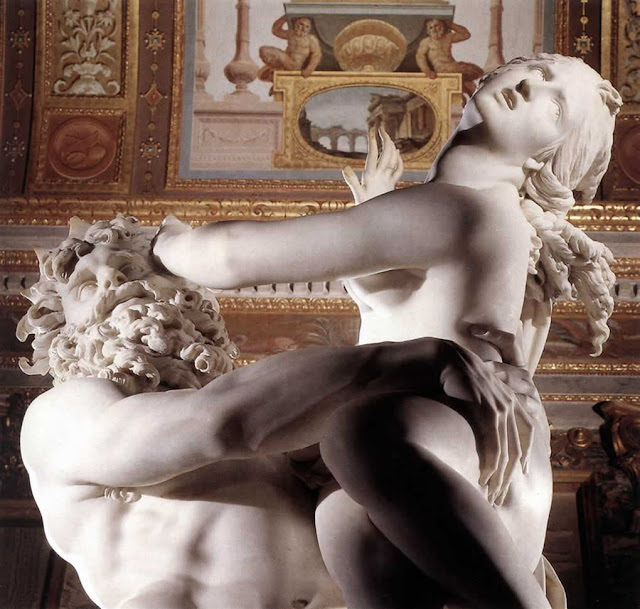Cult of the Unknown God
"A great spring begins with Heraclitus; the spirit applies spot colors. This is also a theft of the mythical world. It has been outraged again and again against the Logos until the present day. In our hands, mythical return has only dialectical meaning; one refers to myth to compare: to show what has been possible. On the other hand, the figure proves itself. Man cedes his freedom to unknown powers. To name them is the real risk of our time."
This occurs as a natural eruption of forces which contributes to religious senses, an uncertainty as if a mist rising from dark moss, or threatening clouds upon the horizon. One must be careful here so as to not become lost, stray into the invisible territory that hides within nature, as if unfolding its husk like a door to the veiled laws where only gods may endure. We must allow the invisible to guide us but not overwhelm us - and certainly not turn us to hostility against the territory in which our vision is so unclear. Only the conditions matter.
The human mind plays its own demonic tricks, we create a third territory beyond the wall of nature to which we enter and stray further from the laws of gods. The Janus-faced is both a human creation and a totem left behind by the gods. The modern period can be seen in this, not an abandonment of the gods but a worship of the effects and instruments of their power. The Aegis shield abandoned by a god in flight, the blood running off of a mountain and the haunting quiet of its dripping reminds us of the vastness of the immaterial. We stand, towering in wonder, before the possibility of wielding these great weapons.
The dominant forms of the theological turn in the West can be understood from this perspective, a layer beneath that which was sowed so long ago now begins to reveal itself. Tradition can no longer be of itself as it has been confused in its conditions. That which bears fruit can no longer be easily picked and taken to market, our territory is overwhelmed by southern winds and rains, we are left to picking mushrooms amidst the rot of imposing foreign climates and the threat of synthetic ticks infected with the waste of paradise. Laws of nature reform in death, each season the turning of the endless pain of failure experienced by a god, and yet what bears itself is the necessity of the descent, the completion of conditions with neither certainty nor paralysis before the future.
Christianity thus appears as a historical necessity and impossibility - a reaction of instrumental theology to replace liberalism's failings within the dark vision of a human-constructed Janus. It does not realise that liberalism is long dead. It cannot see its own body, nor does it want to. The return of paganism is likewise historic, it cannot imagine that its wild gods were ever dead; and thus wanders into the recesses of nature searching for Pan while tearing up all roots with the blinding vision of a Narcissus. Its eyes too have been infected with the theological functionalism of human survival beyond the realm of gods. We wish for Persephone's flowers to abandon us, flee into hell.
The gods are not laws. That is the first lesson, and one which betrays all forms of security and the human sense that it can ever succeed.
Our being is hostile to the gods and yet we will never be a threat to them. In death they return when least expected; their civil war by proxy is patient, brutal in its necessity beyond all vengeance. They need not even act.
It is in cold distance that we see the true extent of divine power, through total abandonment we are forced to prostration just as we raise our arms in victory - descent into pestilence neither a warning nor an example of God's moral will. Simple indecisiveness, an incapacity to deal with human dominion causes this second fall. A hubris before our own form which gives itself over to the godly, the monstrous; willless and complete.
The Jewish G-d prays for his people; the Greek gods descend into nihilism; the Germanic gods die in sacrificial victory; the primitive gods tower over nature creating peace before the sublime; the Christian God self-flagellates for the sins He is about to commit. And the human is paralyzed before his creation, he detests himself in his formalism, devastation the only known result of his works. One can only imagine religion as the smashing of idols, the divine as belief in justice before this act of desecration or the cutting out of one's own figure into the stone of time.
Nihilism is the transitional law of religion, not its opposition. All other laws must remain unstated.
We can neither oppose the formalism of religion, nor abandon it - theological madness reveals more than anything else what we must apprehend. What towers before us now is a great coalition of Christianity with the biological, and a pagan reforming cultishness on uncertain territory. This too appears as the Janus-faced, a reforming of the laws of theological enemies on the grounds of justice. What seems at first as a relief, an opposition determining itself through invisible forces, still threatens with a capacity much deeper than the brutal violence of the wars of Christianity and Humanism. Blood will be shed in time, laws cut away by the decisive sword of justice.
But perhaps the battle will proceed and finalize itself elsewhere, we cannot imagine an endless Pyrrhic victory for humanism, a totalisation of theological nihilism. The end of an era has already unveiled itself, and where it defies these laws in material it is completely destroyed in its essence. Only the gods may endure such conditions; even they war before the Unknown God.



Comments
Post a Comment